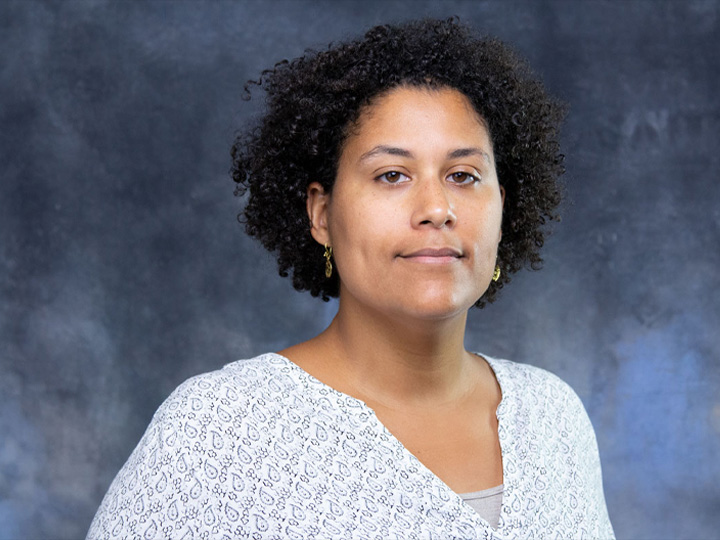
College of Liberal Arts and Social Sciences Associate Professor Rachel Afi Quinn, Ph.D., has received the esteemed Schomburg Center Scholars-in-Residence Fellowship. Passionate about Black art and film, Quinn was selected as one of seven long-term fellows to spend the upcoming academic year researching at the Schomburg Center for Research in Black Culture in Harlem.
“It is a wonderful and prestigious opportunity for Rachel Quinn to be at the Schomburg in the coming months,” African American Studies Interim Chair Linda Reed said. “These fellowships are intensely competitive, which makes the honor even more significant.”
Quinn will begin research funded by the New York Public Library to write a biography centered on biracial child prodigy and Black transnational feminist Philippa Schuyler. Reading by the age of two, composing and playing recitals by four and testing at an IQ of 185 at eight, Schuyler’s unique musical talents, mixed-race background and choices about self-representation made her famous in the 1930s and 40s.
“Professor Quinn and, indeed, UH should be pleased by our esteemed colleague's receipt of this prestigious award,” Moores Professor of History Gerald Horne said. “It signals that even greater things await this distinguished scholar, already viewed widely as a rising star.”
Quinn was selected after completing a 1,500-word description of her proposed study, including her thesis and an outline of the study, an overview of sources and effective utilization of resources, the proposed research methods and more. A curriculum vitae and three recommendation letters were needed as well. She will be in full-time residency at the Schomburg Center, participating in colloquia, seminars and other events as scheduled over the year.
Established in 1983, the Schomburg Fellowship Program has provided direct funding support for 248+ scholars and writers and extensive collections of materials devoted to the preservation and exhibition of African American, African Diaspora and African experiences, including a comprehensive range of art, manuscripts and cultural institutions. The Schomburg Center’s archival collections are an incomparable benefit to history, literature and culture.
Quinn will join the 39th class of Scholars-in-Residence Fellows in September, given a stipend and the use of a private office in the Scholars Center located in the heart of the Schomburg Center. With access to renowned research collections and resources, Quinn will begin writing her second book, “Good Women Die: Re-Envisioning the Life of Philippa Duke Schuyler (1931-1967).”
Award-winning Book Prompts Fresh Look at Caribbean Society
“Good Women Die” will come on the heels of Quinn’s award-winning first book, “Being La Dominicana: Race and Identity in the Visual Culture of Santo Domingo.” Quinn’s in-depth research and investigation merged the analyses of 40+ interviews held primarily in Spanish. Quinn explores college-educated, middleclass Dominican women through a visual lens to provide a fresh take on a Caribbean society and transnational influences of the island.
“My book joins a conversation about blackness and Dominican identity that has been ongoing in Dominican studies among scholars such as Silvio Torres-Saillant, Lorgia García Peña, Frank Moya Pons, Milagros Ricourt, Carlos Andújar, Ginetta Candelario, April Mayes and Dixa Ramírez,” Quinn said.
While immersed in Dominican culture and society, Quinn realized her heightened interest and experiences with Black women, particularly women of mixed African descent living transnational lives, stemmed from similar experiences. “It was important to analyze the visual culture of the context in which Dominican women were forming identities.”
In 2022, “Being La Dominicana: Race and Identity in the Visual Culture of Santo Domingo,” was recognized with the esteemed Isis Duarte Award of the Latin American Studies Association Section on Haiti and the Dominican Republic.
“With this book, I argue that the possibility of misinterpretation is also true for how we see and understand the world visually,” Quinn said. “We assume others are seeing the same things that we are seeing, that they interpret social signifiers in the same ways that we do, but this is not the case.” Language barriers and differences in race, culture and gender prompt chasms for discrepancy and misunderstanding.
Quinn studied complications in visual cues, codes and context, focusing primarily on aspects of the language lost in Spanish and English translation. “My research shows that Spanish and English cannot always hold all the meanings around race that we want them to; visual language is also necessary to understand and decode.”
When living in Santo Domingo, Quinn was immersed in Dominican culture and society. Attending concerts, theater, palos and performance pieces in the park, “I was learning about Dominican society with and among Dominican women who were themselves challenging many of the things they had been taught about who they were supposed to be.”
Key factors in female identity in the Dominican Republic are existing stereotypes, racial ambiguity and color hierarchy, each working to transform experiences and perspective. If interested in further information about Quinn’s research on how visual culture is shaping the lives of Dominican women and its effects on their identities, conversations about the book and further insight can be gained by listening to:
— Presentation to The Baton Foundation (March 20, 2022).
— Interview with Reighan Gillam, Ph.D. for the New Books Network podcast (Nov. 10, 2022)
— University of Houston Book Launch with LeConté Dill, Ph.D. (Oct. 18, 2021)
— Interview with Bryce Henson, Ph.D. and the Association of the Worldwide African Diaspora (Sept. 24, 2021)